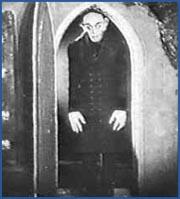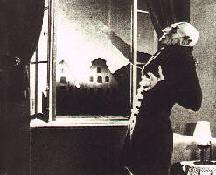Nosferatu (1922)


In late November 1999, I was in the early stages of my University career. I was writing short essays on mostly interesting books, listening to Supersonic, Morcheeba and The Jimi Hendrix Experience and watching superb television thanks to Channel 4s inspired 4Later.
It was a great time. I was living away from home for the first time, I had a bit of money saved up having worked in an electronics factory for a year and I had an eagerly anticipated holiday to Hong Kong to look forward to in April. I watched a bit of 4Later as usual, and was about to call it a night when I saw a quick announcement that the late film would be Nosferatu. Curious, and vaguely remembering something about it being a silent horror movie, I decided to watch it. I went to the kitchen and made myself a rather milky coffee (as was my custom then) and returned to my room, settled down in the duvet and started watching.
Have you ever seen a film that changes your life? Nosferatu was the second film to do this to me. I watched it, spellbound. The coffee stayed where it had been placed on the carpet. My shaving light, accidentally left on, remained on well into the next day, not due to fear but simply because I was utterly immersed in the story I was being told.
I can't remember thinking of anything whilst I watched it (that is, I know that I watched it, and I remember scenes from it, but when I try to think about what I thought when those scenes took place, I draw a blank).
Nosferatu is not a horror film as we have come to know examples of the genre. There are no jumpy scenes, no gratuitous killings, no suave vampires or half naked girls screaming from a castle window. The genius of Nosferatu lies in the state of underlying uneasiness that it conjures in the mind of the viewer. I don't mean uneasiness in the sense of being afraid to walk to the bathroom. It's more the kind of feeling you get when you see something seemingly innocent, but at the same time out of place. From the opening of the film to the closing scene, the viewer experiences a kind of mild dread, not outright fear or jitters, and surely this is the kind of direction modern horror should be moving in (as the Japanese masters of the genre have done in recent years). After all, with Takashi Miike and Hideo Nakata, it's not the exploding bomb but rather the slow ticking that draws their audiences in.
Nosferatu certainly drew me in. I awoke the next morning, with the following couplets literally on my lips:
"Never will his spirit die / For as long as there is sea and sky
You'll hear the flutter of his wings / I am the songbird of death, he sings"
I moved through the rest of the morning and wrote those words down over a coffee, later turning them into a poem. I didn't think exclusively about the film for the rest of that day, but looking back, the feeling of distant, intangible despair/nostalgia for a time I will never know/"otherness" was there .
For the next few weeks I caught myself daydreaming, and then tried to think what I was daydreaming about. Nothing came to mind, but I knew it was Nosferatu. I didn't have to put it into thoughts and words, it was there, somewhere, somehow, in the back of my consciousness, just behind every sentence.

0 Comments:
Post a Comment
<< Home